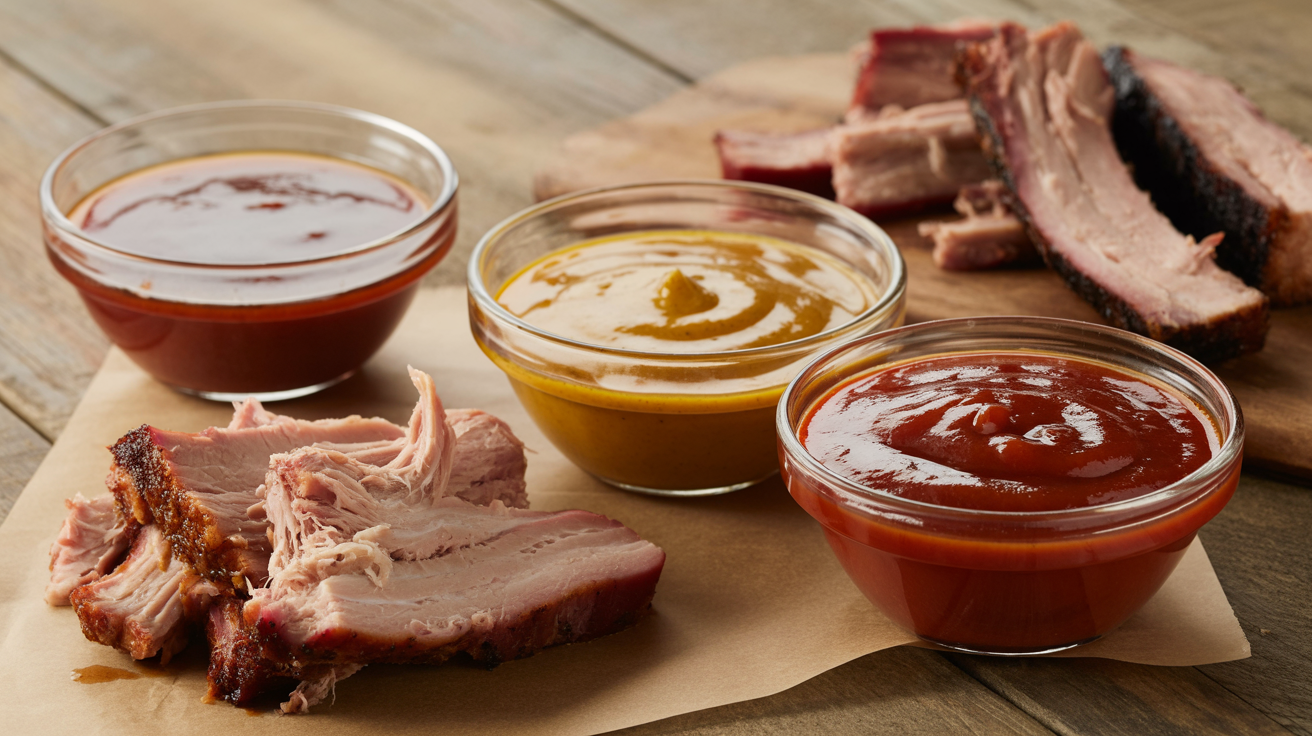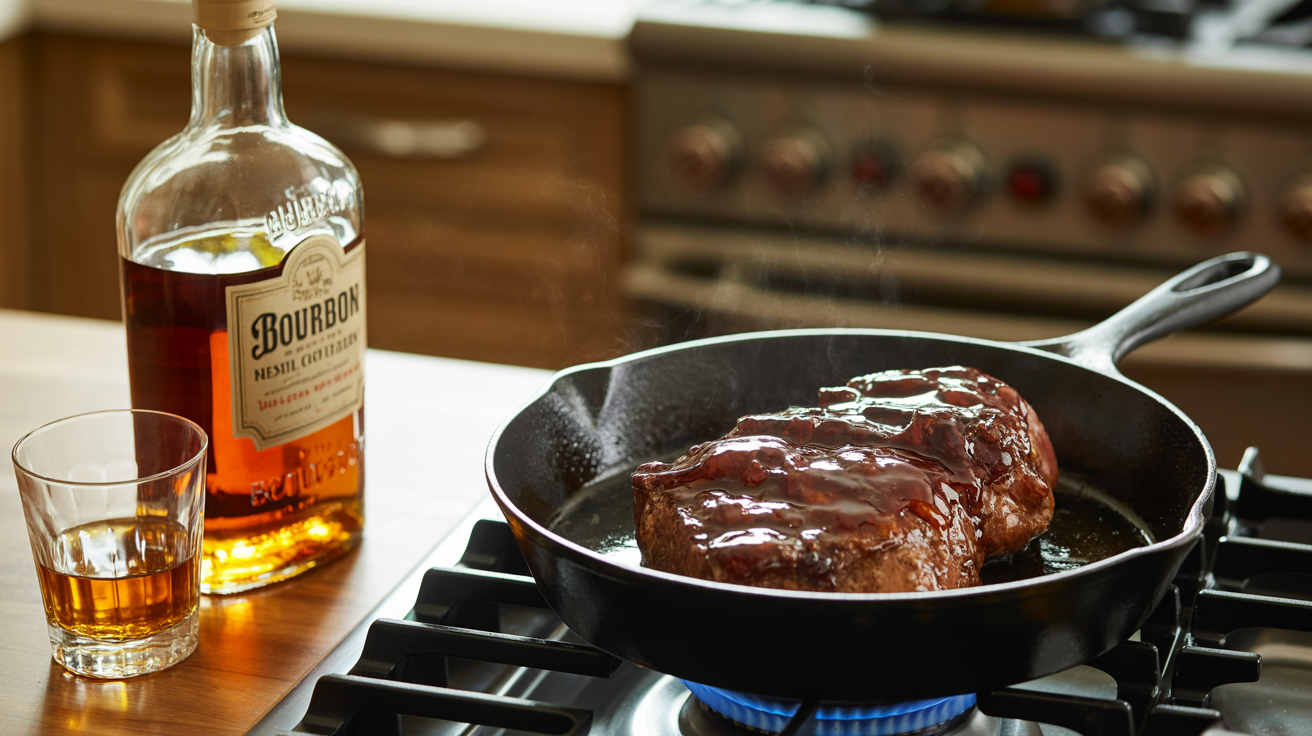Explore the rich traditions behind North Carolina's vinegar-based sauce, South Carolina's mustard sauce, and the tomato-based variations that define regional BBQ identity across the Carolinas.
Share This Recipe
The Carolinas are home to some of the most passionate BBQ debates in the South, and at the heart of this culinary rivalry lies the sauce. Whether you're team vinegar, mustard, or tomato, understanding these regional traditions will deepen your appreciation for Carolina BBQ culture.
The Geography of Carolina BBQ Sauces
The Carolina BBQ landscape is divided into distinct regions, each fiercely protective of their sauce tradition. Eastern North Carolina swears by thin, vinegar-based sauces with just a hint of pepper and spice. Move west toward Lexington, and you'll find the addition of tomato (usually ketchup) creating a slightly sweeter, thicker consistency. Cross into South Carolina, particularly the Midlands region, and you'll discover the golden mustard-based sauce that's found nowhere else in the country.
These divisions aren't arbitrary—they reflect the settlement patterns, agricultural history, and cultural influences that shaped each region over centuries.
Eastern North Carolina: The Vinegar Purist
Eastern North Carolina BBQ is all about the whole hog, and the sauce is designed to complement—not mask—the smoky pork flavor. This thin, vinegar-based sauce typically contains:
The beauty of this sauce lies in its simplicity. It penetrates the meat, adding tang and heat while allowing the natural pork and smoke flavors to shine. Traditionalists apply it during the final stages of cooking and use it as a finishing sauce when chopping the meat.
Recipe: Eastern North Carolina Vinegar Sauce
Combine 2 cups apple cider vinegar, 1 tablespoon red pepper flakes, 1 tablespoon black pepper, 1 tablespoon salt, and 1 teaspoon sugar. Mix well and let sit for at least 24 hours before using. This sauce improves with age and can be stored refrigerated for months.
Lexington-Style: The Tomato Compromise
Move about 100 miles west to Lexington, and you'll find a sauce that bridges Eastern and Western preferences. Known as "Piedmont" or "Lexington-style," this sauce adds tomato to the vinegar base, creating what some call the perfect balance.
Key ingredients include:
This sauce has more body than the Eastern style and offers a sweet-tangy profile that pairs beautifully with pork shoulder. Many Lexington pitmasters apply it during the last hour of cooking, allowing the sugars to caramelize while maintaining the vinegar's tang.
Recipe: Lexington-Style Dip
Whisk together 1 cup apple cider vinegar, 1/2 cup ketchup, 3 tablespoons brown sugar, 2 tablespoons Worcestershire sauce, 1 tablespoon red pepper flakes, 1 teaspoon black pepper, and 1 teaspoon salt. Simmer gently for 10 minutes, then cool before using.
South Carolina's Mustard Belt
South Carolina's mustard-based sauce is the most distinctive of all Carolina BBQ sauces. Concentrated in the central "Midlands" region around Columbia, this golden sauce reflects the German immigrant influence on South Carolina's culinary landscape.
The base typically includes:
This sauce creates a tangy, slightly sweet coating that works beautifully with pulled pork, ribs, and even chicken. The mustard provides a distinctive sharpness that cuts through rich, fatty meat while adding vibrant color to the plate.
Recipe: South Carolina Mustard Sauce
Mix 1 cup yellow mustard, 1/2 cup apple cider vinegar, 1/4 cup brown sugar, 2 tablespoons honey, 2 tablespoons Worcestershire sauce, 1 tablespoon hot sauce, 1 teaspoon garlic powder, 1 teaspoon paprika, and salt and pepper to taste. Whisk until smooth and refrigerate overnight for best flavor development.
The Cultural Significance
These sauce variations represent more than just different flavor profiles—they're markers of cultural identity and regional pride. BBQ joints in each region have been perfecting their sauces for generations, and locals can often identify a sauce's origin with a single taste.
The debates can be heated (pun intended), with each camp claiming superiority. But the truth is, each style evolved to complement the local BBQ tradition, smoking techniques, and available ingredients of its region.
Making the Sauces Work for You
Don't feel bound by geography—experiment with all three styles to find your preference. Consider these pairing suggestions:
Vinegar sauce works best with:
Lexington-style sauce complements:
Mustard sauce pairs beautifully with:
Tips for Sauce Success
1. Let them rest: All these sauces improve after sitting for 24 hours, allowing flavors to meld.
2. Adjust heat levels: Start with less pepper and build up. You can always add more heat, but you can't take it away.
3. Balance is key: Taste as you go, adjusting the vinegar, sweet, and heat elements until they're harmonious.
4. Thin wisely: If a sauce is too thick, thin it with small amounts of vinegar or water rather than changing the flavor profile dramatically.
5. Store properly: All three sauces keep well refrigerated. Vinegar-based sauces can last months; mustard-based should be used within 3-4 weeks.
Bringing Carolina BBQ Home
You don't need a massive smoker or special equipment to enjoy authentic Carolina BBQ sauces. These sauces transform store-bought rotisserie chicken, slow-cooker pulled pork, or even leftover grilled meats into regional specialties.
Try hosting a Carolina BBQ sauce tasting party—make all three styles and let guests vote on their favorite. Serve with pulled pork sliders, coleslaw, and hush puppies for an authentic experience.
The Verdict
There's no "best" Carolina BBQ sauce—only the one that speaks to your palate and traditions. Eastern North Carolina's vinegar sauce offers pure, unadulterated pork flavor with tangy heat. Lexington-style provides a balanced sweet-tangy experience. South Carolina's mustard sauce delivers unique sharpness and visual appeal.
The real winner? The BBQ lover who's willing to explore all three traditions with an open mind and hungry appetite.
Ready to start your Carolina BBQ journey? Begin with one style that sounds most appealing, perfect your technique, then explore the others. Before long, you'll develop your own preferences and maybe even create your own regional fusion.
What's your Carolina BBQ sauce preference? Share your favorite recipe or BBQ memory in the comments below!
*Looking for the perfect pork shoulder recipe to pair with these sauces? Check out our Classic Southern Pulled Pork guide for step-by-step smoking instructions.*
Affiliate Disclosure: As an Amazon Associate, we earn from qualifying purchases.
Never Miss a Recipe!
Join 10,000+ Southern food lovers getting our weekly newsletter with new recipes, cooking tips, and exclusive content delivered straight to your inbox.
Subscribe Now

